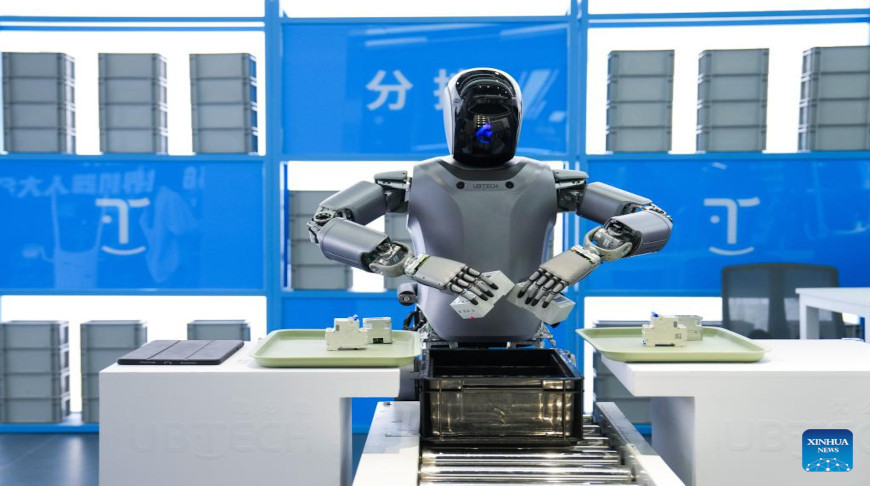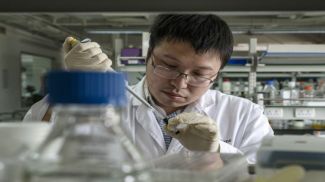
BEIJING, 4 April (BelTA - Xinhua) - At the Zhongguancun International
Innovation Center in Beijing, the humanoid robot Kuavo has become a
familiar sight, effortlessly handling reception duties, responding to
visitor inquiries, and guiding guests in finding their way through the
facility.
"Standing 1.7 meters tall with advanced cognitive capabilities, Kuavo is our next-generation service robot," said Guo Da, sales manager at Shenzhen-based Leju Robotics. "Currently deployed in universities, exhibition halls and automotive plants, the model is set to enter homes and offer services in the future."
The recently concluded 2025 Zhongguancun Forum highlighted China's progress in robotics, featuring nearly 100 humanoid models performing tasks ranging from musical performances to event hosting.
Driven by rapid advancement in embodied intelligence, China's humanoid robots are evolving at an accelerated pace, extending their reach into both industrial and household applications.
Industry data underscores China's growing leadership in the relevant field. According to the Ministry of Industry and Information Technology, the country holds over 190,000 active robotics patents, accounting for roughly two-thirds of the global total.
According to the Chinese Institute of Electronics, China's humanoid robot market is projected to reach 870 billion yuan (about 120 billion U.S. dollars) by 2030.
Several advanced models are already entering commercial use. Developed by the Beijing Innovation Center of Humanoid Robots, the Tiangong Ultra robot is capable of running at 12 km per hour and climbing 35-cm steps, and is preparing for an upcoming humanoid robot marathon.
Meanwhile, Walker S1, developed by the Shenzhen-based tech company UBTECH, is undergoing precision quality inspections at an Audi production facility.
Government support is further accelerating development. Beijing recently unveiled a three-year action plan for embodied intelligence innovation and industrial growth, backed by a 100-billion-yuan fund. Similar initiatives are underway in Guangdong, Sichuan and Shanxi provinces.
Beijing has identified embodied intelligence as a key focus for next-generation AI development, now transitioning from research to commercialization, said Su Guobin, deputy director of the Beijing Municipal Bureau of Economy and Information Technology.
The development prospects of the industry have been impressive. Leju Robotics Chairman Leng Xiaokun noted that Kuavo received 250 orders in the first quarter, surpassing the company's half-year target.
Unitree Robotics Vice General Manager Wang Qizhou has emphasized efforts to boost production efficiency while shifting from pre-trained to autonomous adaptive systems.
"Standing 1.7 meters tall with advanced cognitive capabilities, Kuavo is our next-generation service robot," said Guo Da, sales manager at Shenzhen-based Leju Robotics. "Currently deployed in universities, exhibition halls and automotive plants, the model is set to enter homes and offer services in the future."
The recently concluded 2025 Zhongguancun Forum highlighted China's progress in robotics, featuring nearly 100 humanoid models performing tasks ranging from musical performances to event hosting.
Driven by rapid advancement in embodied intelligence, China's humanoid robots are evolving at an accelerated pace, extending their reach into both industrial and household applications.
Industry data underscores China's growing leadership in the relevant field. According to the Ministry of Industry and Information Technology, the country holds over 190,000 active robotics patents, accounting for roughly two-thirds of the global total.
According to the Chinese Institute of Electronics, China's humanoid robot market is projected to reach 870 billion yuan (about 120 billion U.S. dollars) by 2030.
Several advanced models are already entering commercial use. Developed by the Beijing Innovation Center of Humanoid Robots, the Tiangong Ultra robot is capable of running at 12 km per hour and climbing 35-cm steps, and is preparing for an upcoming humanoid robot marathon.
Meanwhile, Walker S1, developed by the Shenzhen-based tech company UBTECH, is undergoing precision quality inspections at an Audi production facility.
Government support is further accelerating development. Beijing recently unveiled a three-year action plan for embodied intelligence innovation and industrial growth, backed by a 100-billion-yuan fund. Similar initiatives are underway in Guangdong, Sichuan and Shanxi provinces.
Beijing has identified embodied intelligence as a key focus for next-generation AI development, now transitioning from research to commercialization, said Su Guobin, deputy director of the Beijing Municipal Bureau of Economy and Information Technology.
The development prospects of the industry have been impressive. Leju Robotics Chairman Leng Xiaokun noted that Kuavo received 250 orders in the first quarter, surpassing the company's half-year target.
Unitree Robotics Vice General Manager Wang Qizhou has emphasized efforts to boost production efficiency while shifting from pre-trained to autonomous adaptive systems.













